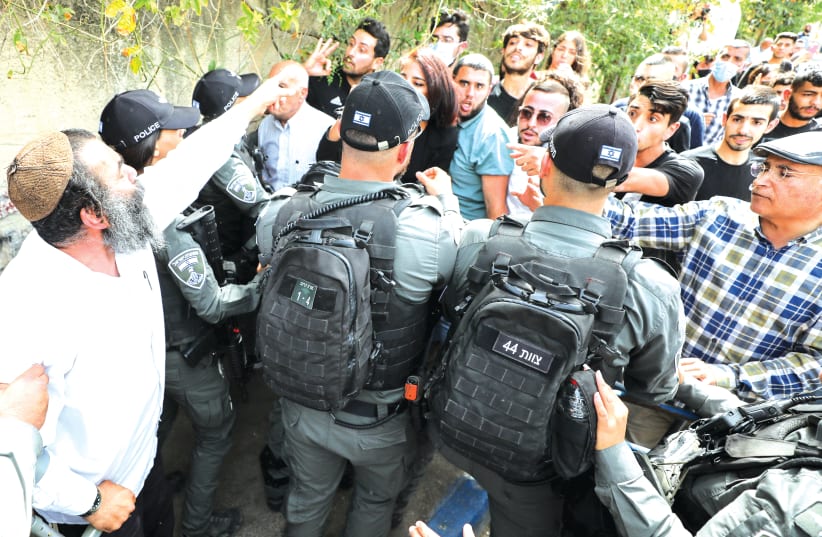The government does not plan to evict Arab residents of Jerusalem’s Sheikh Jarrah neighborhood over a property dispute in light of how heated the matter has become, according to a source close to Prime Minister Naftali Bennett.
The High Court of Justice scheduled a hearing for Monday on the eviction of four Palestinian families from Sheikh Jarrah, the east Jerusalem neighborhood known in Hebrew as Shimon Hatzadik. Lower courts have upheld claims that the property is owned by the Nahalat Shimon Company, which seeks to develop the land for Jewish housing.
Even if the verdict allows for the eviction of the Palestinian residents, the court is unlikely to order the state to enact it or give a deadline to do so, the source close to Bennett said, adding that the government will take advantage of that to not fuel the flames of conflict in Jerusalem.
A 1991 decision by then-attorney-general Yosef Harish grants the police authority to decline to implement evictions if is a great danger from doing so.
The High Court is expected to rule on the matter of Sheikh Jarrah while Bennett's National Security Adviser Eyal Hulata and Diplomatic Adviser Shimrit Meir plan to be in Washington to meet with their American counterparts ahead of a visit by the prime minister to the White House, likely to take place in late August. US Secretary of State Antony Blinken has repeatedly expressed concern that evictions in Sheikh Jarrah could spark tensions and even war.
The plight of Sheikh Jarrah’s residents has received international attention, and not evicting them will refute claims that the fighting between Israel and terrorist groups in the Gaza Strip in May began because of evictions in the Jerusalem neighborhood, the source added.
Israel has argued that Hamas, which shot a barrage of rocket at Jerusalem and thousands into other areas of Israel, took up the issue of Jerusalem and escalated its attacks as part of a power struggle with the Palestinian Authority after the PA canceled a parliamentary election.
A difference between the Sheikh Jarrah case and the illegally built Bedouin enclave of Khan al-Ahmar near Kfar Adumim in the West Bank is that the government is not a party to the Sheikh Jarrah dispute, the source said.
The government is currently reviewing whether to continue the previous government’s postponement of the demolition of Khan al-Ahmar.
In previous hearings on the matter of Sheikh Jarrah, Nahalat Shimon was able to prove a chain of ownership for the property going back to Jewish families before the establishment of the State of Israel.
The four families whose homes are in question are part of a group of 28 who fled their houses in other parts of Israel during the 1948 War of Independence and came to east Jerusalem, which was in Jordanian hands after the war. Jordan gave them housing in Sheikh Jarrah on land owned by Jews; in exchange, they gave up their refugee status.
They are barred by Israeli law from reclaiming their homes in the western part of Jerusalem, Jaffa, Haifa and elsewhere.
The Sheikh Jarrah land was originally owned by two Jewish organizations, but it now belongs to Nahalat Shimon.
Tovah Lazaroff contributed to this report.
